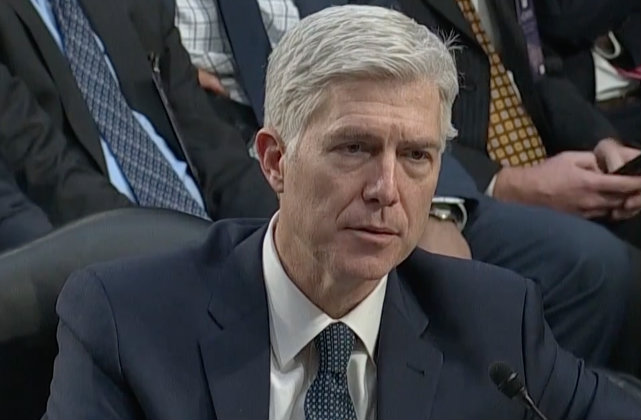
WASHINGTON (AP) — One of Neil Gorsuch‘s sharpest dissents as an appeals court judge came just six months before he was nominated for the Supreme Court.
That’s when he sided with a New Mexico seventh-grader who was handcuffed and arrested after his teacher said the student had disrupted gym class with fake burps.
Nearly a year later, Gorsuch sits on the nation’s higher court and the boy’s mother is asking the justices to take up her appeal. She’s using Gorsuch’s words to argue that she has a right to sue the officer who arrested her son.
The court could act as early as Monday, either to deny the case or take more time to decide.
Justices typically withdraw from cases they heard before joining the Supreme Court, which means Gorsuch probably would not have any role in considering this one. But that hasn’t stopped lawyers for the mother from featuring his stinging dissent prominently in legal papers. Gorsuch said arresting a “class clown” for burping was going “a step too far.”
“If a seventh-grader starts trading fake burps for laughs in gym class, what’s a teacher to do?” Gorsuch wrote. “Order extra laps? Detention? A trip to the principal’s office? Maybe. But then again, maybe that’s too old school. Maybe today you call a police officer. And maybe today the officer decides that, instead of just escorting the now compliant thirteen-year-old to the principal’s office, an arrest would be a better idea.”
Whether the Supreme Court ultimately takes the case or not may have nothing to do with Gorsuch. The justices have repeatedly turned away disputes over school disciplinary policies. Or they may decide it’s not important enough for the court to intervene.
The appeal comes as some school districts have been rolling back “zero tolerance” discipline policies that expanded in the 1990s. The shift is aimed at preventing students from getting caught up in the criminal justice system.
The New Mexico incident began in 2011 when the student, known only as F.M. in court papers, kept interrupting his physical education class with fake burps. The teacher sent him into the hallway, where he continued burping and laughing as he leaned into the classroom entrance.
The teacher called for assistance on her school radio, and soon Arthur Acosta, a police officer assigned to the school, arrived in the hallway, according to court documents.
Acosta took the boy to the school’s office, then placed him under arrest for violating a New Mexico law that prohibits anyone from disrupting the education process. Acosta handcuffed the student and took him to the juvenile detention center, where the boy stayed about an hour until he was picked up.
His mother, Annette Montano, sued school officials and police, arguing that arresting her 13-year-old son was unreasonable under the law. A federal judge ruled against her.
The 10th U.S. Circuit Court of Appeals ruled 2-1 that the officer was immune from liability because he did not violate clearly established law. The majority said the law prohibits disruption and nothing indicates the law was meant to criminalize only more serious misconduct than burping or laughing in class.
Gorsuch, in dissent, said the court was ignoring a crucial distinction “between childish pranks and more seriously disruptive behaviors.”
The boy’s mother argues that if burping is enough to warrant criminal punishment, then traditional penalties such as expulsion, suspension and detention would have no place in school.
“Children would be subject to arrest for any trivial or child-like act of indiscretion,” lawyers for the mother say in a brief to the court.
Acosta’s lawyer says the criminal act was the boy’s “interference with the educational process, not the act of burping.” He argues that the state has authority to define the law, and courts should not question the policy choices behind laws criminalizing the kind of misconduct that led to the boy’s arrest.
Advocacy groups including the Juvenile Law Center and Campaign for Youth Justice have urged the court to hear the case. They say making “commonplace behavior” a crime will harm children, particularly those from minority groups that studies show are disproportionately affected by school discipline policies.
[Screengrab via PBS]